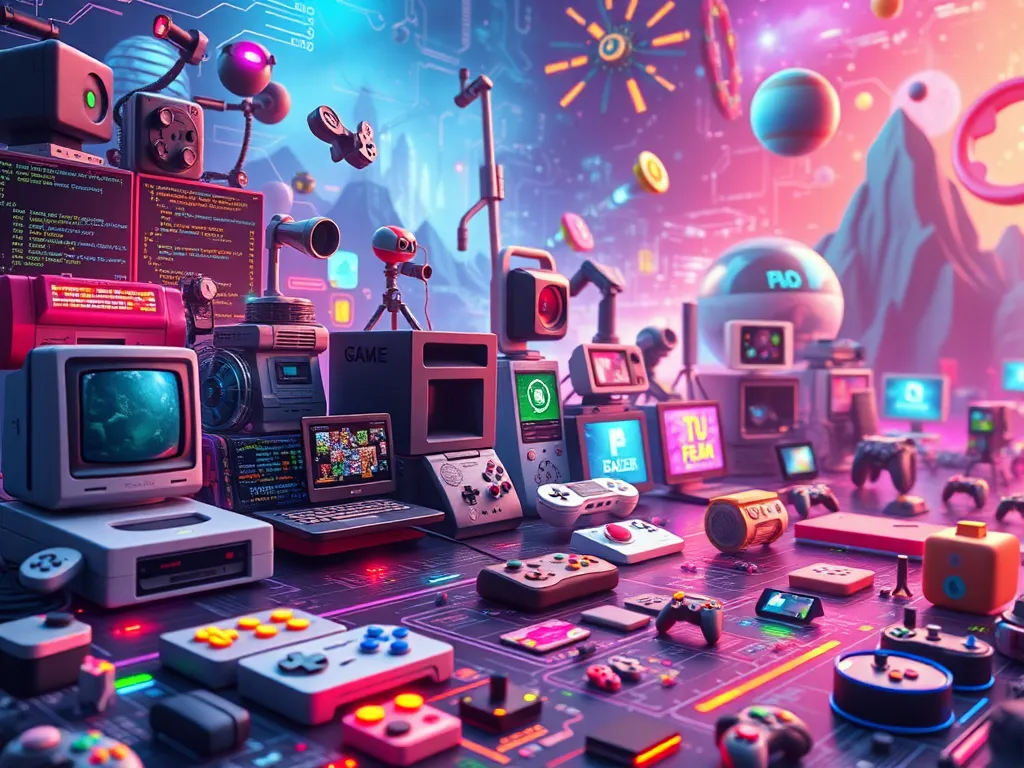The Evolution of Game Development in the Digital Age

The Evolution of Game Development
The Evolution of Game Development has been a fascinating journey since the inception of the first video games in the 1970s. From simple pixelated graphics and limited gameplay mechanics to the complex, immersive worlds we experience today, game development has transformed into a sophisticated industry. Developers have continuously pushed the boundaries of technology and creativity, shaping the way we interact with digital media.
In the early days of game development, a handful of programmers would sit in dark rooms, coding games that would run on primitive systems. As technology advanced, so did the complexity of games. The Evolution of Game Development intertwined with the rise of personal computers and video game consoles, leading to an explosion of creativity and innovation. The industry began to grow in diversity, appealing to a broader demographic of players.
The rapid evolution of technology has transformed the landscape of Game Development, opening new creative avenues for developers.
The Evolution of Game Development has also been marked by significant technological advancements. The introduction of high-definition graphics, motion capture, and artificial intelligence has allowed developers to create more realistic and engaging experiences. As we moved from 2D to 3D environments, game worlds became richer and more detailed, leading to new genres and gameplay styles. Online multiplayer gaming has also redefined how players connect and compete with one another.
In addition to technological growth, the methodologies behind game development have evolved. Developers now have access to advanced tools and frameworks that streamline the production process. Agile and iterative development methods have become popular, allowing teams to adapt more quickly to player feedback and changing market demands. Collaboration among teams has also improved, as remote working has become commonplace, enabling a global talent pool to contribute to projects.
As we look to the future, The Evolution of Game Development appears poised for even more exciting changes. With the rise of virtual and augmented reality, game development is entering uncharted territory that promises to blur the lines between reality and the digital world. Furthermore, the integration of blockchain technology may change how we perceive ownership and monetization in the gaming industry, setting the stage for new economic models.
Historical Overview of Game Development
The early stages of game development can be traced back to the 1970s, when games like 'Pong' and 'Space Invaders' emerged as the first commercial successes. These simple games laid the groundwork for the gaming industry and inspired a generation of developers. During the 1980s, home consoles such as the Atari 2600 surged in popularity, giving rise to the first gaming home market.
The rise of video game consoles during the 1980s and 1990s marked a significant turning point in the industry. With the introduction of systems like the Nintendo Entertainment System (NES) and Sega Genesis, game development experienced a renaissance. Developers began to utilize more sophisticated graphics and gameplay mechanics, captivating millions of players worldwide.
The influence of personal computers on gaming became more pronounced in the late 1980s and early 1990s, with titles like 'Doom' and 'Myst' showcasing the potential of PC gaming. The ability to create immersive experiences with complex narratives attracted a different audience, cementing the importance of personal computers in The Evolution of Game Development.
Arcade gaming emerged as a cultural phenomenon in the 1980s, with arcades becoming social hubs for gamers. Developers created arcade games with engaging gameplay that encouraged competition. The success of arcade machines led to the eventual development of home versions, further propelling the gaming industry into mainstream culture.
Impact of Technology
Advancements in graphics technology have been at the forefront of The Evolution of Game Development. From 8-bit graphics to photorealistic visuals, improvements in hardware and software have allowed developers to create visually stunning experiences. Realistic textures, lighting, and physics have all contributed to immersive game worlds.
The shift from 2D to 3D gaming marked a revolutionary change in the industry. Titles like 'Super Mario 64' and 'The Legend of Zelda: Ocarina of Time' showcased the possibilities of 3D environments, allowing players to explore vast worlds and engage with complex gameplay mechanics. This transformation paved the way for modern game design.
The role of the internet in gaming cannot be overstated. Online multiplayer gaming has created communities of players who can connect regardless of their physical location. Developers have capitalized on this by creating expansive online worlds and experiences, ushering in the age of games as a service (GaaS) where ongoing updates and content are crucial.
The mobile gaming revolution has changed the landscape of The Evolution of Game Development. With the proliferation of smartphones, gaming has become more accessible than ever. Developers are now creating games optimized for mobile platforms, resulting in an explosion of casual gaming and the emergence of new revenue models, such as free-to-play with microtransactions.
Game Development Methodologies
The comparison of Waterfall vs Agile development in gaming reflects the evolving nature of project management in the industry. While the Waterfall model followed a linear path with distinct phases, Agile methodology emphasizes iterative development and flexibility. This shift enables developers to respond more swiftly to player feedback and evolving market trends.
Prototyping and testing have become integral to game design. Developers now utilize rapid prototyping to test game mechanics and gather player feedback early in the development process. This iterative approach allows teams to refine ideas and identify potential problems before full-scale production.
The use of game engines in modern development has revolutionized The Evolution of Game Development. Engines like Unity and Unreal Engine empower developers to create high-quality games with comparatively less effort and time. These engines provide robust tools for graphics, physics, and scripting, allowing teams to focus on creativity rather than reinventing the wheel.
Collaborative tools for remote teams have gained significance, especially after the global shift to remote work. Platforms for project management, communication, and version control have become essential in enabling diverse teams from around the world to work together effectively on game development projects.
Cultural Influence of Games
The cultural narratives reflected in gaming can influence how stories are told across mediums. Games often explore themes such as heroism, sacrifice, and morality, allowing players to experience complex narratives through interactive means. The Evolution of Game Development showcases this growing understanding of storytelling within the gaming framework.
Storytelling within games has taken center stage, with developers now crafting narratives that rival those of films and novels. From character development to plot twists, the intricacies of storytelling enhance player engagement and emotional investment, showcasing the potential of games as storytelling devices.
Diversity and representation in gaming have become focal points in recent years. Developers are increasingly addressing issues of stereotypes and representation, creating games that reflect a diverse range of characters and narratives. This shift not only broadens the audience but also enhances the gaming experience for all players.
The impact of gaming on youth culture is profound, as games have become a popular form of entertainment and identity formation among young people. The Evolution of Game Development reflects changing societal norms and values, with games increasingly addressing real-world issues and fostering community engagement among players.
Future Trends in Game Development
Virtual Reality (VR) and Augmented Reality (AR) gaming are leading the charge for the future of The Evolution of Game Development. These technologies promise to enhance immersion and interactivity, creating experiences that transport players to new worlds and allow them to interact with their surroundings in unique ways.
Artificial Intelligence (AI) in game design is set to revolutionize how games are created and experienced. AI can enhance gameplay, create dynamic narratives, and adapt difficulty levels in real time, providing tailored experiences that respond to player behavior and choices.
The role of blockchain in gaming is gaining traction, with potential applications in ownership, in-game economies, and digital rights. This technology could change the landscape of asset ownership, enabling players to truly own in-game items and trade them securely with others.
Predictions for the next decade of gaming suggest continued advancements in graphics and technology, as well as a focus on more immersive gameplay. As developers continue to innovate and explore new frontiers, The Evolution of Game Development is set to take players on exhilarating journeys that push the boundaries of imagination and interaction.
